List of Middlebury College buildings

The following buildings are located on Middlebury College's campus in the Champlain Valley in Vermont, United States.[1]
List of Middlebury College buildings on Middlebury, Vermont campus[edit]
| Image | Name | Year built/opened | Description |
|---|---|---|---|
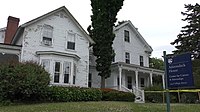 |
Adirondack House | Remodeled in 1909 after being obtained by the college.[2] Formerly housed the Center for Careers and Internships (CCI). During the COVID-19 pandemic, ADK was transformed into isolation housing for infected students, and is now a dormitory for upperclassmen. It also houses Coltrane Lounge, which is used as an event space, as well as the student-run college bike shop in the basement. | |
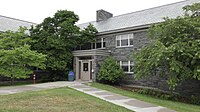 |
Allen Hall | 1963[2] | 1st-year residence hall[2] |
 |
Alumni Stadium | ||
 |
Atwater Hall A | 2004[3] | Suite housing for upperclassmen[3] and a popular party space.[4][5] The Atwater dorms are often referred to as "fratwater" and Atwater is used as a metonym for the party scene at Middlebury.[6] |
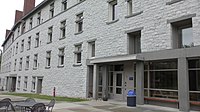 |
Atwater Hall B | 2004[7] | Suite housing for upperclassmen[7] and a popular party space.[4][5] The Atwater dorms are often referred to as "fratwater," and Atwater is used as a metonym for the party scene at Middlebury.[6] |
 |
Atwater Dining Hall | 2005[8] | Formerly open for breakfast, lunch, and special events. As an attempt to curb the spread of COVID-19, Atwater is now open for 3 meals a day during the week, and closed during the weekends. |
 |
Axinn Center At Starr Library | 2008[9] | The Axinn Center is an adaptation of Starr Library, which was built in 1900 and expanded multiple times. Now houses classrooms and faculty offices in addition to the original library.[9] |
 |
McCardell Bicentennial Hall | 1999[2] | Science building;[2] home to an observatory with a 24-inch (0.61 m) optical telescope[10] and a greenhouse. Known colloquially as "BiHall,"[11][12] it is home to the largest window in the state and is popularly thought to be the second-largest building in Vermont by floor area.[13][14] |
 |
Battell Hall | 1950 and 1955[2] | First year dormitories named for Joseph Battell. Originally built as two separate buildings, Battell North and Battell South, with the center connecting the two constructed in 1955.[2] |
 |
Centeno House | Houses the Parton Center, the college's health center | |
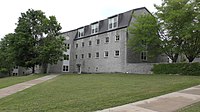 |
Coffrin Hall | 1986[2] | Primarily a dormitory for sophomores and a few first years[2] |
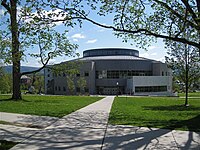 |
Davis Family Library | 2004[2] | Built on the site of the former Science Center[2] |
 |
Franklin Environmental Center at Hillcrest | Houses environmental studies offices and classrooms in a LEED Platinum-certified building.[15] | |
 |
Freeman International Center | 1970[2] | A former dining hall, now houses classrooms, the offices for the German, Japanese, and Russian departments, and the Hillel Jewish Center[16] |
 |
Gifford Hall | 1940[2] | Sophomore Dormitory, also houses the Gamut Room performance space and outdoor "gampitheatre"as well as a seminar room. |
 |
Hadley Hall | 1969 or 1970[2] | Sophomore dormitory. On the right side of the image; Milliken Hall is on the left, and Ross Tower is in the middle |
 |
Hathaway House | Houses the Charles P. Scott Center for Religious Life and the Chaplain's Office | |
 |
Hepburn Hall | 1916[2] | Dormitory, also houses the newsroom for the Middlebury Campus student newspaper in the basement and the Hepburn Zoo, a blackbox theatre, on the second floor. The Zoo, a former dining area, is so-named because it was originally adorned with the hunting trophies of A. Barton Hepburn '71 (1871), who gave the hall as a gift to the school. Hepburn Hall was also originally painted bright yellow but was repainted gray following Hepburn's death to better match the rest of the campus' buildings.[2] |
 |
Johnson Memorial Building | 1968[2] | Houses the architecture and studio art departments |
 |
Kenyon Arena | 1998[17] | Hockey arena with a seated capacity of 2,600 |
 |
Kelly Hall | 1969 or 1970[2] | Upperclassmen residence[18] |
 |
Kirk Alumni Center | ||
 |
LaForce Hall | 2004[2] | Upperclassmen residence |
 |
Lang Hall | 1969 or 1970[2] | Upperclassmen residence |
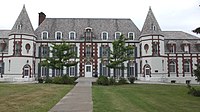 |
Le Château | 1925[2] | Home to the Department of French; also contains classrooms and student housing[2] |
 |
Mahaney Arts Center | 1992[2] | Also home to the Middlebury College Museum of Art,[2] the 370-seat Robison (concert) Hall, the 160-seat Dance Theatre, and 200-seat black box Seeler Studio Theatre[19] |
 |
McCullough Student Center | 1912[2] | Originally a gymnasium; converted into a student center after an expansion and remodel[2] |
 |
Memorial Field House | 1949[2] | Building is a former air base in New York. It was moved to Middlebury by truck and reassembled there.[2] |
 |
Middlebury Chapel | 1916[2] | Chapel for formal events; built in the style of a traditional New England meeting house combined with the marble of the American neoclassical style. Above the colonnade is a quote from Psalm 95, "The strength of the hills is His also." Also has an 11-bell carillon.[2] |
 |
Milliken Hall | 1969 or 1970[2] | Sophomore dormitory |
 |
Munroe Hall | 1941[2] | Houses classrooms as well as faculty offices for the political science, religion, sociology and anthropology, and economics departments |
 |
Old Chapel | 1836[2] | Administrative building[2] |
 |
Painter Hall | 1816[2] | The oldest Vermont college building still standing; used as a dormitory as of 2019. National fraternity Kappa Delta Rho was founded in Painter Hall in 1905.[2] |
 |
Pearsons Hall | 1911[2] | Sophomore dormitory |
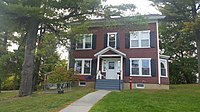 |
Perkins House | Spanish house | |
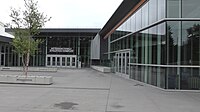 |
Peterson Family Athletics Complex | ||
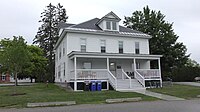 |
Porter House | ||
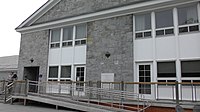 |
Proctor Hall | 1960[2] | Contains a dining hall and the college bookstore, as well as the recording studio for college radio station WRMC-FM.[2] |
 |
Ridgeline Townhouses | 2016[20] | Upperclassmen housing, newest buildings on campus. Became the subject of considerable controversy beginning in 2015 when the student body learned that the buildings would not be accessible to mobility-impaired and disabled students.[21] Over 467 students, or a fifth of the student body, signed a petition calling on administration to halt construction until the buildings could be redesigned to be accessible, but this did not happen and the Ridgeline Townhouses were built on schedule.[22] |
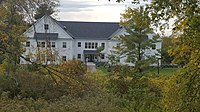 |
Ridgeline View Suites | 2016[20] | Upperclassmen housing, newest buildings on campus. Became the subject of considerable controversy beginning in 2015 when the student body learned that the buildings would not be accessible to mobility-impaired and disabled students.[21] Over 467 students, or a fifth of the student body, signed a petition calling on administration to halt construction until the buildings could be redesigned to be accessible, but this did not happen and the Ridgeline suites were built on schedule.[22] |
 |
Robert A. Jones '59 House (RAJ) | Home to the Rohatyn Center for International Affairs (RCFIA)[23] | |
 |
Ross Dining Hall | 2004 | |
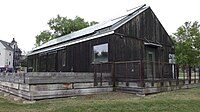 |
Self Reliance | 2009[24] | Middlebury College's first house built for the Solar Decathlon competition[24] |
 |
Service Building and Biomass Gasification Plant | The $12 million biomass gasification plant, opened in 2009, boils and gasifies wood chips to provide steam heating and electricity to the college[25] | |
 |
Starr Hall | 1860[26] | Rebuilt in 1865 after a fire in 1864[26] |
 |
Stewart Hall | 1956[2] | First Year Residence hall[2] |
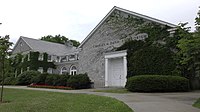 |
Sunderland Language Center | 1965[2] | Language classrooms and offices; also houses the 272 seat Dana Auditorium, used for lectures, movie screenings, and other events[19] |
 |
Alexander Twilight Hall | 1867[27] | Named for Alexander Twilight, the first African-American man to earn a degree from an American college or university. Colloquially known as "Twilight," it houses classrooms and the classics, philosophy, and education departments.[27] |
 |
Virtue Field House | 2015[28] | Contains a 200-meter indoor track[28] in a LEED Platinum-certified building.[29] |
 |
Voter Hall | 1913[2] | Houses faculty offices for the Arabic, Chinese, and Italian departments on the first floor and basement and upperclassmen housing on the upper floors as of 2019. Originally built as a chemistry building.[30] |
 |
Warner Hall | 1901[2] | Houses the economics and mathematics departments |
 |
Wright Hall | Houses the 350-seat Wright Theatre[19] | |
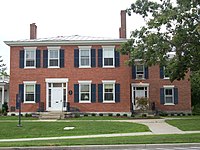 |
Emma Willard House | 1811[2] | Used as the college's admissions building. National historic site[2] |
 |
Forest Hall | 1936[2] | Dormitory, also houses a darkroom and Islamic prayer space in the basement. Name derived from the fact that its construction was financed by the 1915 sale of a forest to the Federal Government to create the Green Mountain National Forest.[2] |
| Natatorium | 1996[2] | ||
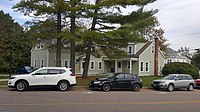 |
118 South Main Street | Houses the Center for Creativity, Innovation & Social Entrepreneurship (CCISE), also known as the "Innovation Hub"[31] | |
| 121A South Main Street | |||
 |
75 Franklin Street | Bread Loaf offices | |
 |
Bowker Barn | Staff offices | |
| Brainerd Commons House | |||
 |
Carr Hall | 1951[32] | Houses the Anderson Freeman Center, a student center that works to promote a welcoming and inclusive environment for minority and first-generation students[32] |
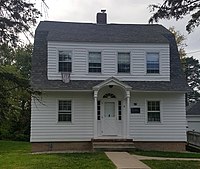 |
Chellis House | Home to the gender studies department and the Women's and Gender Studies Resource Center | |
 |
Farrell House | Faculty offices, used by the economics department as of 2019 | |
 |
Hesselgrave House | Faculty offices | |
 |
Kitchel House | 1867[33] | Home to Middlebury's Center for Careers and Internships'[33] |
| Marble Works Offices | Houses finance, human resources, and business services departments in a building off the campus itself | ||
| Nichols House | |||
| Old Court House | In the town of Middlebury, off the campus itself | ||
| President's House | |||
 |
Public Safety | ||
| Center for Community Engagement | |||
 |
Wonnacott Commons House | ||
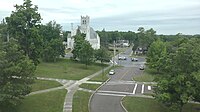 |
107 Shannon Street | Senior housing (house behind the church) | |
| 220 College Street | |||
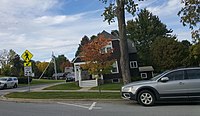 |
248 College Street | Senior housing | |
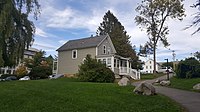 |
23 Adirondack View | Events staff offices | |
 |
33 Adirondack View | ||
| 48 South Street | A dormitory, formerly home to the Kappa Delta Rho fraternity/social house before it was shut down in 2015 due to a hazing violation[34] | ||
| 637 College Street | Russian house | ||
 |
70 Hillcrest Road | Home to the Queer Studies House (QSH, pronounced "kwish"), an academic interest house for students interested in queer studies, since 2008[35] | |
 |
99 Adirondack View | ||
 |
Bowker House | Xenia social house | |
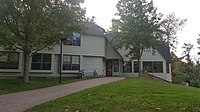 |
Brackett House | 1997[36] | Tavern social house |
 |
Brooker House | 1997[37] | Outdoor interest house and home to the school's Mountain Club |
| Chinese House | |||
 |
French House | ||
| Hadley House and Barn | Used to host college guests[38] | ||
 |
Hebrew House | ||
| Homer Harris House | |||
| Homestead House | |||
| InSite Solar Decathlon House | 2013[39] | Middlebury's second house built for the Solar Decathlon; LEED Platinum certified[40] | |
 |
Japanese House | ||
| Jewett House | Wellness House | ||
 |
Longwell House | Italian house | |
 |
Max Kade Center for German Studies at the Deanery | German house | |
| McKiney House | |||
 |
Meeker House | Dormitory | |
| Munford House | Dormitory | ||
 |
PALANA House | PALANA (Pan-African, Latino, Asian, and Native American) is the Intercultural Academic Interest House for students interested in diversity and intercultural issues | |
| Palmer House | 1997[41] | ||
 |
Portuguese House | ||
 |
Prescott House | 1997[42] | Chromatic social house, formerly home to Alpha Delta Phi fraternity/social house until its suspension in 2013.[43] |
 |
Ross Tower | Dormitory. Ross Tower is on the left of the image, and Milliken Hall is on the right. | |
 |
Sperry House | Arabic house | |
 |
The Mill | Social house | |
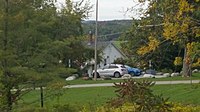 |
Turner House | Senior housing | |
| Weybridge House | Food studies special interest house | ||
| David W. Ginevan Recycling Center |
See also[edit]
References[edit]
- ^ "Quick Facts". Middlebury. Retrieved 2 October 2018.
- ^ a b c d e f g h i j k l m n o p q r s t u v w x y z aa ab ac ad ae af ag ah ai aj ak al am an ao ap aq ar as at au av aw Andres, Glenn; Callahan, Anne (2005). "A Walking History of Middlebury". The Henry Sheldon Museum of Vermont History. Retrieved 2 October 2018.
- ^ a b "Atwater Hall A". Middlebury. Retrieved 2 October 2018.
- ^ a b Merrell, Cole (December 9, 2015). "SGA Speed Dating: The Grilled Cheese Sandwich to Your Atwater Suite Hangover?". The Middlebury Campus. Retrieved 3 October 2018.
- ^ a b Ahearn, Catherine (April 15, 2009). "Atwater suites remain prime real estate". The Middlebury Campus. Retrieved 3 October 2018.
- ^ a b Sex Panther (May 3, 2017). "Time to Stop Accepting Atwater Norms". The Middlebury Campus. Retrieved 3 October 2018.
- ^ a b "Atwater Hall B". Middlebury. Retrieved 2 October 2018.
- ^ "Atwater Commons Dining & Residence Halls" (PDF). Middlebury.edu. Retrieved 2 October 2018.
- ^ a b "Middlebury dedicates Axinn Center at Starr Library on October 18". 17 December 2009. Retrieved 2 October 2018.
- ^ "The 2015 Middlebury College Observatory Upgrades Program". Mittelman Observatory. 19 June 2014. Retrieved 2 October 2018.
- ^ "Friday Feature with Middlebury's Maddie Morgan". NESCAC. November 3, 2017. Retrieved October 15, 2018.
- ^ Lantz, Asher (May 10, 2017). "The Bi Hall Telescope: A Closer Look". The Middlebury Campus. Retrieved 16 October 2018.
- ^ O’Hara, Robert J. "McCardell Bicentennial Hall at Middlebury College (RJO's Views)". rjohara.net. Retrieved 3 October 2018.
- ^ "McCardell Bicentennial Hall". Middlebury Interactive Map. Middlebury College. Retrieved 2 October 2018.
- ^ "Franklin Environmental Center". U.S. Green Building Council. Retrieved 25 January 2019.
- ^ "Freeman International Center". Middlebury Interactive Map. Middlebury College. Retrieved 2 October 2018.
- ^ "Kenyon Arena". Middlebury Interactive Map. Middlebury College. Retrieved 2 October 2018.
- ^ "Kelly Hall". Middlebury Interactive Map. Middlebury College. Retrieved 2 October 2018.
- ^ a b c Haverford College Arts Programs: Reports and Perspectives (PDF) (Report). Haverford College. April 23, 2008. pp. 55–61. Retrieved October 14, 2018.
- ^ a b DiGravio, Will (March 23, 2016). "Lottery Held for Ridgeline Townhouses". The Middlebury Campus. Retrieved 3 October 2018.
- ^ a b Patton, Laurie (November 4, 2015). "Reflections from Old Chapel". The Middlebury Campus. Retrieved 3 October 2018.
- ^ a b Middlebury Campus editorial board (November 4, 2015). "Pragmatic Passion on Ridgeline Project". The Middlebury Campus. Retrieved 3 October 2018.
- ^ "Robert A. Jones \'59 House (RAJ)". Middlebury Interactive Map. Middlebury College. Retrieved 2 October 2018.
- ^ a b "Self-Reliance House". Middlebury. Retrieved 2 October 2018.
- ^ Flagg, Kathryn (February 19, 2009). "Middlebury College fires up $12 million biomass plant". Addison County Independent. Retrieved October 14, 2018.
- ^ a b Glenn M. Andres and Curtis B. Johnson, “Middlebury College” [Middlebury, Vermont], SAH Archipedia, eds. Gabrielle Esperdy and Karen Kingsley, Charlottesville: UVaP, 2012—. http://sah-archipedia.org/buildings/VT-01-AD30. Accessed 2018-10-18.
- ^ a b "Alexander Twilight Hall". Middlebury Interactive Map. Middlebury College. Retrieved 2 October 2018.
- ^ a b "Virtue Field House". Middlebury Interactive Map. Middlebury College. Retrieved 2 October 2018.
- ^ "Middlebury College Virtue Field House". U.S. Green Building Council. Retrieved 25 January 2019.
- ^ "Voter Hall". Middlebury. Retrieved 18 October 2018.
- ^ Franek, Robert (June 13, 2017). Colleges That Create Futures, 2nd Edition: 50 Schools That Launch Careers by Going Beyond the Classroom. Random House Children's Books. ISBN 978-1-5247-1030-9.
- ^ a b "Carr Hall". Middlebury Interactive Map. Middlebury College. Retrieved 2 October 2018.
- ^ a b "Kitchel House". Middlebury Interactive Map. Middlebury College. Retrieved 2 October 2018.
- ^ Flaherty, Joe (April 8, 2015). "Hazing Violation Suspends KDR". The Middlebury Campus. Retrieved 2 October 2018.
- ^ "About the QSH". The Queer Studies House.
- ^ "Brackett House". Middlebury Interactive Map. Middlebury College. Retrieved 2 October 2018.
- ^ "Brooker House". Middlebury Interactive Map. Middlebury College. Retrieved 2 October 2018.
- ^ "Hadley House and Barn". Middlebury Interactive Map. Middlebury College. Retrieved 2 October 2018.
- ^ "InSite Solar Decathlon House". Middlebury Interactive Map. Middlebury College. Retrieved 2 October 2018.
- ^ "InSite". U.S. Green Building Council. Retrieved 25 January 2019.
- ^ "Palmer House". Middlebury Interactive Map. Middlebury College. Retrieved 2 October 2018.
- ^ "Prescott House". Middlebury Interactive Map. Middlebury College. Retrieved 2 October 2018.
- ^ Tudor, Thilan (June 18, 2006). "Prescott to be Offered as Superblock". The Middlebury Campus. Retrieved 2 October 2018.
External links[edit]
![]() Media related to Buildings of Middlebury College at Wikimedia Commons
Media related to Buildings of Middlebury College at Wikimedia Commons
